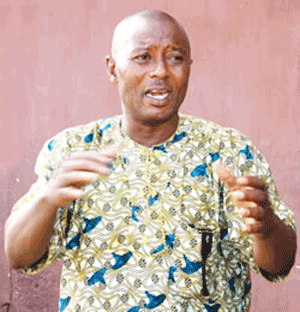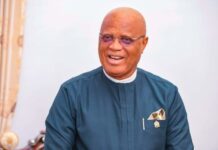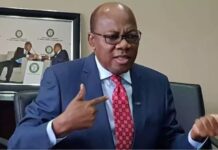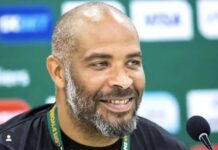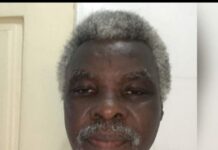Mike Onyemachara was reportedly healthy when his wife left for work and kids left for school only for them to return and see that the food served him on the table was not touched and he was dead.
By Emma Ogbuehi
Former Super Eagles defender, Mike Onyemachara, is dead.
Onyemachara, a member of the silver medal winning Flying Eagles team to Saudi Arabia in 1989, reportedly died on Thursday, May 4, 2023.
Though circumstances surrounding his death were still sketchy as at press time, information reaching TheNiche indicate that the ace footballer who also played for the Super eagles died in his 3-bedroom apartment in Ajegunle.
He was reportedly healthy when his wife left for work and kids left for school only for them to return and see that the food served him on the table was not touched and he was dead.
Some of his team mates who were very close to him, however, said that he had been complaining of back pains in recent times.
Onyemachara, a highly skillful defender, played most of his club football with First Bank of Lagos and was an influential member of the Saudi 89 Flying Eagles team.
In an interview in 2014 published in TheNiche, Mike Onyemachara called on up-and-coming footballers to be more dedicated to the game of football, if they want to achieve success.
“It pains me to see Nigerian players not dedicated, committed and determined. They have not reached any heights, yet they are wearing earrings and plaiting hair. We didn’t do all that in our time. They should make their names first,” he added.
Onyemachara, who was a prominent member of the 1989 national team, the Flying Eagles, that represented the country at the Under-20 World Cup in Saudi Arabia, narrated how the team performed the famous ‘Damman Miracle’.
The deadly defender recalled how he ventured into football and became a household name against his initial interest of going into music, and how the Flying Eagles came back from 4-0 to win the quarter-final match against USSR, a feat that came to be known as “the Damman Miracle.”
He said: “When I was in secondary school, my initial intention was to go into music. I know how to sing very well. But as the Games Prefect of my school, I played football very well too.
“Even when I gained admission into the polytechnic, I was still active as a footballer. My elder brother, who was working with First Bank, took me to Lagos after I finished from secondary school.
“I then played for the bank for six years, and I eventually captained the team. That was how I developed interest in football and tactfully dumped music.”
The quiet but unassuming stopper was later invited to the Flying Eagles from First Bank.
His words: “I would say, man proposes but God disposes because I wanted to be a musician but turned out to be a footballer.
“So playing for the country was the greatest thing that has ever happened to me because it was the desire of every player to play for his country, make a name and dedicate his career to his country.
“All these I have fulfilled and I am happy for the little contribution I made in the country’s football scene.”
He also recalled his debut match for the country.
“My first game was against Zaire away; it was a 1989 U-20 World Cup qualifier. It was a beautiful day, I must confess. We were in Maiduguri for camping when we were told that we would play Zaire.
“They brought a chartered flight to Maiduguri, which took us to Lagos. We went to Zaire from there. I was overjoyed seeing myself in a chartered flight. I asked myself: Am I the one going to represent this country? I never believed it. It was like a joke.
“If you haven’t played for your country at any level of the World Cup, it is like you’ve not really done your best. So, I was happy to have helped in qualifying my country for the World Cup.
“At least, we showcased ourselves to the world at the tournament; coming out second was not a mean feat.
“Our toughest game was against the USSR in the quarter-final, but we were lucky to level up and eventually won the match.”
According to him, “Coming back from 4-0 down was not by our own making; it was by God’s grace. I was even praying God to help us reduce the score line, so that we don’t look humiliated when we return home.
“If the score line read 4-2 or 4-3, it would still have been better. But I was surprised when we equalised with less than 24 minutes to the end of the match.
“The mood in the camp changed and we were all very happy. It was celebration galore; everyone was mad. The Russians knew that they were lucky because we could have won the game 5-4 under 90 minutes, but Oladimeji Lawal threw away a chance before the game went into extra time and then penalties. They were not too happy; their president sent a chartered flight from Russia immediately to pick them up.
“It was not a Nigerian celebration alone; it was worldwide because people hardly saw that kind of comeback in a World Cup.
“After the game, we went out for shopping in our green and white tracksuits. A Saudi Arabian, who sold shoes, saw us and said, ‘Are you Nigerians?’ We said, ‘Yes’. It was Dimeji Lawal, Nduka Ugbade, Jimoh Balogun and I.
“He took us to his shop and there were shoes everywhere. He said, ‘Pick any pair of shoe of your choice’. And we did. He asked, ‘How many of you came?’ And we said, ‘25’. He then replied, ‘When you get to the hotel, tell the others to come and pick their shoes as well’. We did and every one of us got new pair of shoes from the man. That was why I said it was a worldwide celebration. It was when we came back to Nigeria that we learnt that every street was blocked after we achieved that feat.”
He was, however, not surprised that the team lost in the final of the competition to Portugal because of crisis in the team prior to the final match.
“If we played that final game over and over again, we will lose because we lost the face of God. We won all our matches through God’s mercies, but the day we wanted to play our last match, we lost the face of God because there was quarrel in the team.
“It happened to the Israelites. There was chaos in our camp. In the morning and before going to bed, we used to pray together as a team; but a night before the final match, we had problems.
“We came out to pray, but it was not as it used to be because of the quarrel. We never believed that it was God that was doing it for us; pride and ego came in and God turned his back on us. If you look at the two goals Portugal scored against us, they were cheap goals,” he said.
Despite his feats with the U-20 team, he had a brief stint with the senior national team, the Super Eagles, not because he was not good enough, but because of politics in the team.
He eventually retired from active football in 1998.
He said: “Dimeji Lawal, Chris Ohenhen, Nduka Ugbade, Chris Nwosu, Mutiu Adepoju and I were in the Super Eagles camp in the early 1990s, but because of personal problems between coach Tunde Disu and Clemens Westerhof, the later saw us as a threat to him.
“He decided to push all of us out. He felt we might form a clique in camp to destroy him. Only Mutiu was retained. I was in camp severally; Edema Fuludu, Willy Okpara and Davidson Owumi were my roommates.
“Thank God I played for the junior national team and was called up to the senior national team. I was part of the game where Alloy Agu lost his teeth in Ghana. I was dressed for the game. So, I don’t have regrets.
“Whether you like it or not, one thing or another will lead you into retirement. In my case, I had an injury on my left knee while at Iwuanyanwu Nationale and I couldn’t go further; so I had to quit playing in 1998.”

